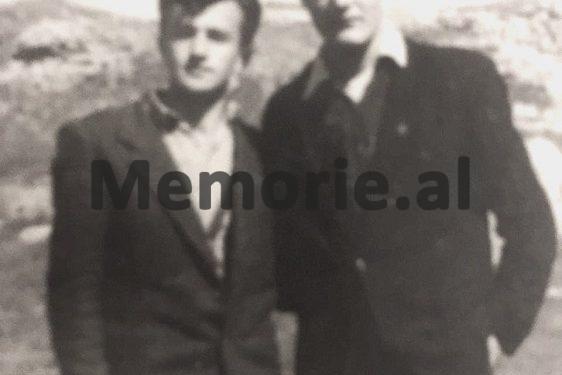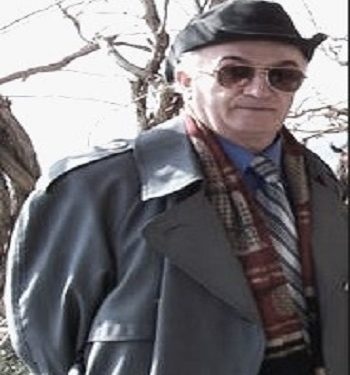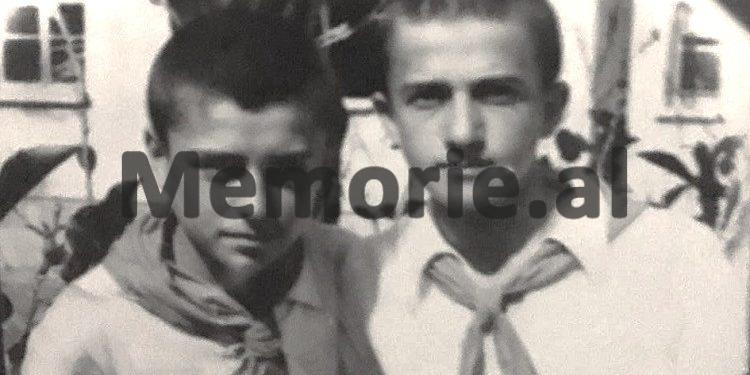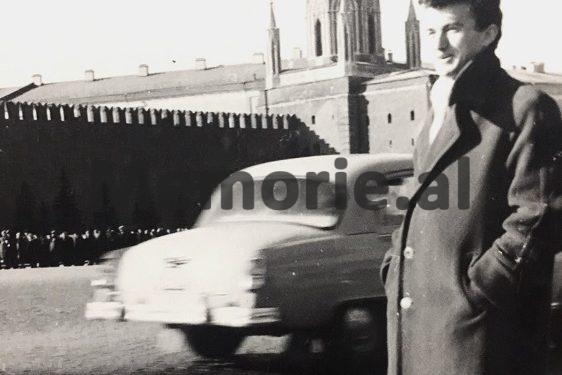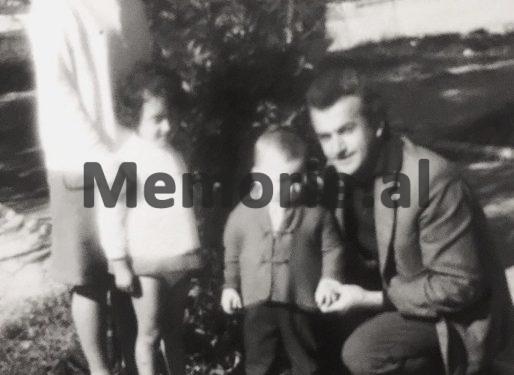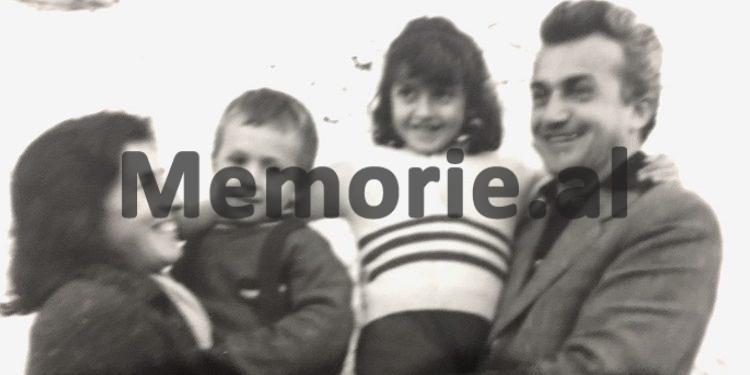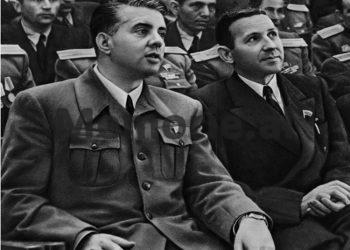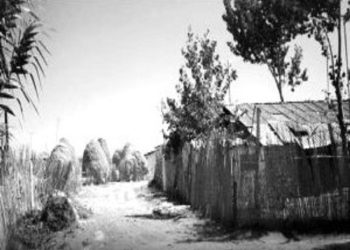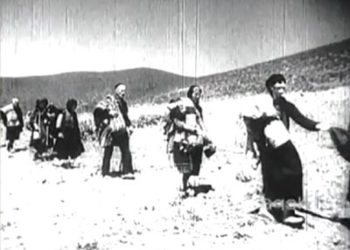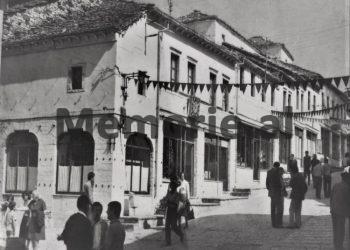From Sokrat Shyti
Part twelve
Memorie.al / The writer Sokrat Shyti is the “great unknown” who, for several years, has revealed the tip of the iceberg of his literary creativity. I say this based on the limited number of his published books in recent years, primarily the voluminous novel “Nata fantazmë” (Tirana 2014). His novels: “PËRTEJ MISTERIT”, “MES TUNDIMIT DHE VORBULLËS”, “GËRRYERJET E MAKTHIT”, “HIJA E TURPIT DHE E VDEKJES”, “KOLONELI KRYEDHJAK”, “SHPRESAT E NËMURA”, “PËSHTJELLIMET E FATIT” I, II, “MBIJETESA NË KASOLLEN E LOPËS”, as well as other works, all novels ranging from 350 to 550 pages, are in manuscript form waiting to be published. The dreams and initial excitement of the young novelist, returning from studies abroad full of energy and love for art and literature, were cut short early on by the brutal edge of communist dictatorship.
Who is Sokrat Shyti?
Having returned from studies at Moscow State University, right after the rupture of Albanian-Soviet relations in 1960, Sokrat Shyti worked at Radio “Diapazon” (which at that time was located on Kavaja Street), in an editorial office with his journalist friends – Vangjel Lezho and Fadil Kokomani – both later arrested and subsequently executed by the communist regime. Besides the radio, Sokrati, at the age of 21, if we may imagine, had passionate literary interests at that time. He wrote his first novel “Madam doktoresha” and was on the verge of publication, but… alas! Right after the arrest of his friends, to fill the cup, a brother of his, a painter, fled abroad.
Sokrat was arrested in September 1963, and in November of that year, he was sent into internment (together with his mother and younger sister) to a location between Ardenica and Kolonje in Lushnja. For 27 consecutive years, the family lived in a livestock shed made of reeds, without windows, while Sokrat was subjected to forced labor. During these 27 years, he was legally obligated to report three times a day to the regional authority. He had no right to move from the place of internment and was deprived of any kind of documentation, etc. In these conditions, among a livestock shed, he gave birth and raised his children. It was precisely from this event, or rather a very long history of persecution, that he was inspired to write the book “Survival in the Livestock Shed”!
Agron Tufa
Continued from the previous issue
EXCERPT FROM THE BOOK, “SURVIVAL IN THE COW SHED”
I thanked him for the care shown towards me and my family, for the support and assistance, not only because he gave me the opportunity to save a sum of money and freed me from a debt to my mother, but because he saved me from falling into the abyss of despair.
-“Time management is always a top priority for everyone,” he emphasized. “The saying that is so often used and quite significant: ‘Time is gold,’ refers to programming. Every minute wasted in a day creates such a great void after a few years that you can hardly believe you inflicted this loss on yourself, which cannot be compensated by any effort. Therefore, each of us must constantly turn to our awareness with the questions: Did I use my time well today? Did I fulfill all my obligations? Only those who educate themselves with the discipline of work do the most essential service to themselves.”
I felt happy to receive these valuable commendations from my director of the seven-year school, and I was leaving proudly from my childhood home, with obligations fulfilled, just as every boy my age should, who has contributed as much as possible to the well-being of the household, convinced that during the coming school year, I would not burden them or require any small monthly assistance.
I had not yet told my mother about the conversation with the school director, that as of today, I had stopped working, therefore tomorrow I would not be going early in the morning as usual, but after 10 o’clock. She, not knowing what had happened and considering my concerns regarding work, was worried about my unusual delay and entered the room to see why I wasn’t getting out of bed.
-“Don’t you feel well?” … she asked, worried.
-“I’m sorry for not informing you yesterday about quitting the job!” – I apologized, rising from my seat. – “Did you leave on your own, or did they tell you to go?” – she added, frightened.
-“Since I finished the first block of Amza’s work and the time to leave for the dormitory is approaching, it was the right moment to hand in the work I completed,” – I replied to calm her.
-“Was the school director satisfied?” – she wanted to know.
-“He gave me a commendation and congratulated me and gave me some valuable advice for the work to consider in the future.”
-“Instead of resting, you started working on the first day!” … she said with complaint.
-“I am quite pleased that I spent the time working, because not only did I put myself to the test, but I practiced my handwriting too!” – I responded, hugging her.
On the way to school, I thought of my classmates. Some of them, after finishing the seven-year school, did not continue their studies: The boys, who could hardly wait to receive the certificate of release, said; thank goodness we’re done with lessons, and they turned to trades.
While some girls remained homemakers. I heard that two or three of them had been engaged by their parents, as proposals had come from candidates with good jobs and homes in the capital, regardless of the inappropriate age, as they were still young, teenagers! Meanwhile, the rest of us scattered to the secondary schools in the main cities of the country. Only Maliqi from my childhood friends continued with me at the gymnasium in Shkodër as a boarder.
When I noticed the director on the exterior platform of the stairs, an inner concern troubled me and stirred the suspicion that perhaps the bureaucrats hadn’t given me my pay. Or they may have been stingy, allocating an amount equal to half of what was expected, accompanied by all sorts of explanations, which had made me anxious.
At that moment, I felt like the peasant with the jar of yogurt on his head, who, while walking, calculated how much money he would make when he sold it and with that amount, he would buy some eggs to give to the hen; then, when the chicks grew up and became chickens, he would feel wealthy, and out of joy, he would dance! And under the influence of this intoxicating mirage, he made a swift movement with his body, causing the jar of yogurt to fly off his head and shatter into pieces!
-“Are you well at home?” – the director asked me, concerned. – “Because your gloomy face has an internal reason…?”
-“Perhaps today I didn’t wake up early, as I usually do when I come to work, and I still look a bit drowsy…” – I replied.
-“Come, let’s go upstairs to sign the payroll,” – he added cheerfully. After that reply, the color of my face returned, and my confidence came back, realizing that my suspicion from a minute ago was just a mirage caused by fear, under the insecurity of some charlatan bureaucrats, who constantly lead you to the fountain and don’t give you a drop of water to drink!”
-“After many fierce arguments between me and the officials, we reached an agreement for a monthly salary of five thousand lek,” – said the director, extending the payroll for me to see with my own eyes. – “At first, they insisted on paying you as a student. But I insisted that every job is valued based on its volume and quality. According to their version, you would receive half of that amount today!” – he added, annoyed.
-“When I saw that they wouldn’t back down from paying you as a student, I told them that I would take this matter up for consideration with the grassroots organization, then with the Bureau of the Party Committee of the district, because what you propose is essentially a true capitalist show, exploiting minors! After this warning, the bureaucrats were frightened and handed me the envelope with the money. I counted it: a total of twelve thousand five hundred, signed their payroll, put the envelope in my pocket, and set off for here.”
-“So you withdrew it today?!” I asked, somewhat astonished.
-“There was a debate over this as well,” – the director added. – “They insisted stubbornly that this supplement be marked at the end of the school payroll, meaning in September. I rejected that, stating the urgent situation that you are a boarder, with no income, soon to leave, and the family has no means to assist. You should know: bureaucracy suffocates you if you do not oppose it with the force of reasoning!”
I thanked the benevolent director, who during these months treated me like his own son, significantly easing the burden of shock from the loss of my father, and created employment conditions that yielded wonderful results: it felt as though I had won a fortune!
-“I have complete confidence that in the elite Gymnasium where you are studying, you will represent our school with dignity until the end!” – said the director, embracing me. – “Here, you were the commander of the group. There, you surely must be the pride of the Gymnasium! And after passing the Matura with excellent results, the paths are open for you to continue university studies in a chosen field, which is given to candidates with outstanding abilities! Best of luck to you!”
Even though the director’s farewell was a continuation of his generosity, without which I would not have had this wonderful opportunity to heal my pain and spend such fruitful time, I could hardly bear to leave this place, this environment where I had worked for two and a half months and successfully completed the new Amza, because I wanted to show my mother the envelope with the sum of money as soon as possible, to hand her seven thousand five hundred lek, keeping only five thousand for my personal expenses for the whole year.
My mother was astonished when I took the envelope out of my pocket and spread the bills on the table. Then, when the fog of confusion cleared, she spoke in a trembling voice: – “To tell you the truth, until this moment, I didn’t believe that you would be paid…” – she said. – “I thought more likely that they would consider it volunteer work, explaining that since you were a student at this school, you were expected to reward the school for the knowledge and education you gained here. In the end, they would suffice with a few kind words and a certificate of appreciation…!”
-“That’s what they intended to do, and they would have done it if the school principal had not insisted: After finishing the work, they would have said nice words to me and given me stones in my backpack! But fortunately for us, thanks to the principal’s efforts, my work was valued like all other jobs, and as it deserved!” – I added joyfully, embracing her.
-“Did they pay you as an adult?” … – she asked, glancing at the banknotes.
-“The same amount as my sister’s salary, who works at the post office!” – I replied proudly.
-“Just so you know: this amount earmarked for the household, I will cover with blessings, like something sacred, and I will not touch it!” – she promised. – “Let it stay there for any need. Our ancestors didn’t say it for nothing: money in white for a rainy day! It’s important that I have it firmly in my mind that you have a lek with you to wet your mouth, since you, my son, are picky when it comes to eating; you can’t adapt to the pot in the dormitory.”
The days leading up to my departure were spent organizing my things. I bought underwear at the store, certainly the essentials: undershirts and underpants, thick cotton shirts, and flannel shirts to keep warm, considering the harsh winter with frost, and that the path from the dormitory to the school was crossed by piercing cold drafts that numbed our ears and fingers. During these days, I went several times to my older sister’s house to spend time with my three nephews (the oldest being nine, the second seven, and the youngest one).
I remembered my childhood when Maks and Sifi were very small. My sister dressed them both alike, in overalls and white shirts with butterflies, and combed their hair, which was like yellow silk, into curls. As I was only seven years older than the oldest, I loved the little kids and often took them both by the hand to walk.
The signs indicated that the two brothers had a talent for painting, but only the oldest continued his studies after finishing the eight-year school at the Artistic High School in Tirana. Before leaving, I also went one more time with my neighbor Muka to the Church of Golem to greet my father and my second brother, to let them know that I would try to be worthy like them, following their example, and honor our family name! (Once again, there were bouquets of fresh flowers on both graves!).
When we returned from the Church of Golem, we went to Muka’s house to see Mother Kade. When she opened her arms to embrace and kiss me, I told her not to squeeze me so tightly as to “squeeze the life out of me.” She and Muka burst out laughing. Then she pulled out two figs and two pomegranates that she had boiled, wrapped them in newspaper, and wished me a safe journey and success in my studies.
To honor the efforts of the school director, a day before my departure, I went to express my heartfelt thanks once again, promising to keep the name “Model” of the school high. He embraced me with paternal love and emphasized that he had complete confidence that I would succeed in obtaining a scholarship to study abroad.
Now, before my departure, I understood how significant the timing of my return home was, when the wound of grief from the loss of my father had begun to scab over, and all the funeral services in the final residence had been carried out with grandeur and love by the residents of the Church. Then came the beneficial resolution of my employment, which was accompanied by receiving that amount of money, so necessary for me and the household.
Furthermore, I went to the graves of my father and brother with my mother. The silent stay within the Church. The care of the prayer and the churchgoers. The wise interventions of the priest to avoid wailing and screaming. The advice of Mother Kade.
Muka’s interest in finding the “Xhip.” All of this eased the parting of mother and son on the day of my departure. Of course, we were both emotional and stayed hugged for a while. But we managed not to cry out loud. The long time spent together, the established daily routine, the warm conversations between mother and son brought back to both of us the years when I lived here as a son of this house and a school student.
Muka had taken the initiative, without telling me, to coordinate my departure with service in Tirana, with the commander or commissar of the brigade, one of the last days of August. And he surprised me the next day when he informed me that “at seven in the morning, you should be in front of the Military Branch with your suitcase, as you will travel with the brigade commander to Tirana!”
He felt quite happy that he had arranged this comfortable journey, which shortened the time by a few hours and reduced fatigue, since it was uncertain whether I would find a place to sit on the train. With the “Xhip,” I would be comfortable and would reach the bus agency much faster to buy the ticket.
When I got off the “Xhip,” I thanked the brigade commander for making my journey easier. He gave me a look as if he were asking, “Where did you come from?” (Because during the trip, we hadn’t exchanged a word; he remained silent, preoccupied with reporting to the Ministry of Defense, thinking about how his superiors would receive the readiness of his unit) and told the driver: “Go ahead!”
At the passenger agency near the City Clock, there were quite a few passengers. At the closed ticket counter, a notice read “No tickets available for today.” If I hadn’t kept the letter from the person in charge of the Shkodër passenger agency for his colleague in the capital, through which he requested that I be given a ticket from the reserved seats, not only would I have been stuck there, but I would have had to stand in line until the sales hour for the next day. Therefore, I knocked on the door of the cabin. When the seller opened the door, I handed him the letter and waited anxiously for his response.
-“You have a strong friend!… – he said, cutting the ticket. – Can the bus take you? I’ll give your number five, since you are a fifth-grade student…” – he smiled. – “That’s what I’ve written here.”
-“He asked me to send his regards and thanks to you!” – I said as I took the ticket. – “At what time does the bus leave from here?” – I asked.
-“Be here at one o’clock,” – he replied. – “When you get off the bus, don’t forget to send my friend the regards and greetings. Leave your suitcase here, so you don’t have to carry it around with you. At least for these hours that you are free, you shouldn’t have the extra load when you go into shops. If you need to enter crowded places, like here, keep an eye out for pickpockets. Or better yet, don’t mix with them. And if you intend to buy something, use the smallest bills so you don’t draw attention, as pickpockets know boarders and know that before the start of the school year, they carry a good sum of money with them.”
I thanked him for the ticket and the advice, which taught me how to be cautious. The most suitable place to pass the time seemed to me the Soviet Union Bookstore, which was near the city clock, because there it was always quiet; people don’t push each other like in stores, there are no pickpockets, and it’s pleasing to the eyes when you see shelves filled with thick-covered books and wonderful bindings. As soon as I entered, I glanced over the shelves of artistic books. I felt pleasure when I saw “War and Peace,” “Anna Karenina,” “Crime and Punishment,” “The Idiot,” “Notes from the House of the Dead,” “Quiet Don,” “The Captain’s Daughter,” “Eugene Onegin,” “The Sisters,” “Mayakovsky.”
Fortunately, all of these works had been masterfully translated into Albanian and were read by me. However, there was a fundamental difference in the quality of the publications: Our editions looked outdated, as if they had come from the printing press a century ago, which led the authors to feel disappointed that their works had been reduced to an even worse state, with such a miserable appearance akin to clandestine manuscripts! The books coming from Moscow shone, bringing the grandeur of the giant state from there! Afterwards, my interest shifted to books on the visual arts./Memorie.al
To be continued in the next issue.




